Insights into current scientific findings
Each episode focuses on a new, exciting topic: interested listeners gain insights into current scientific findings and research work at the university's four Schools. The episodes are published at regular intervals on the website and on the usual podcast platforms and can be listened to and subscribed to free of charge.
Spark! is produced by the Executive Departments for Press, Communication and Marketing in cooperation with the Center for Information and Media Technology (Zimt).
Issue 16: Mental health in old age
Interview with psychology professor Dr. Simon Forstmeier
There have never been as many older people as there are today - which makes the question of how we can remain mentally healthy in old age all the more important: What constitutes mental health in old age - and how can people cope with stress, loss and traumatic experiences? In this podcast episode, psychology professor Dr. Simon Forstmeier reports on his research into so-called life review therapy, in which consciously remembering and classifying one's own life story plays a central role. Prof. Forstmeier showed that this form of therapy can be effective even in the most severe traumas in a special research project that he carried out together with colleagues in Israel: therapeutic work with elderly Holocaust survivors. Read more about this impressive experience and his current studies in this issue.

Listen to all issues
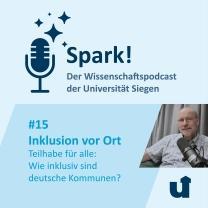
People with disabilities should be able to participate in social life without restrictions. This is stated in the UN Convention on the Rights of Persons with Disabilities, which has also been applicable law in Germany since 2009. In practice, however, we are still a long way from achieving this in some cases: only 41% of German districts and larger cities have any plans for implementing the convention in progress or have already completed them. This is shown by a recent study conducted by the University of Siegen together with the German Institute for Human Rights. This is not nearly enough, says Prof. Dr. Albrecht Rohrmann, head of the Siegen study. At the same time, however, he also sees that the UN Convention on the Rights of Persons with Disabilities has set a lot in motion in local authorities. How inclusion can succeed locally and what it takes to achieve it is the topic of this podcast episode.
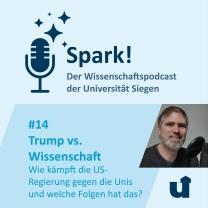
The scientific community and universities in the USA are under massive attack from the Trump administration - on many different levels: Universities are being threatened and in some cases receiving millions in funding cuts, research funding is being massively reduced, numerous research projects are being halted and the visas of international visiting students are being canceled. This podcast episode looks at why the right-wing movement has declared academia its "enemy", what goals it is pursuing with its attacks on researchers and universities - and what consequences are to be feared for the scientific community in the USA and worldwide. Our guest is Prof. Dr. Daniel Stein, who researches American popular culture and lived in the USA for three years.
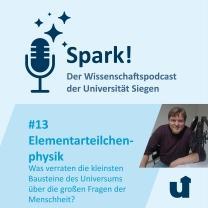
What are we made of? How did our universe and all the matter in it come into being? How can phenomena such as dark matter or gravity be explained? In order to find answers to such fundamental questions, elementary particle physicists look at the tiniest details: they investigate the smallest known particles and the forces that act between them - with the aim of gaining an even better understanding of our universe. To this end, particle physicists carry out extremely complex experiments on large particle accelerators. On the other hand, they are developing mathematical methods to calculate the properties and interactions of elementary particles ever more precisely. This podcast episode is all about theoretical elementary particle physics. Our guest is Prof. Dr. Alexander Lenz, who heads the world's largest group in theoretical flavor physics at the University of Siegen.
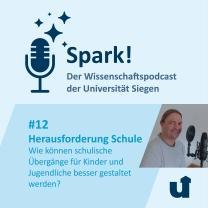
New environment, new processes, new expectations: When children move from nursery to elementary school - or, a few years later, to secondary school - it is a major turning point. Routes to school have to be mastered, new friends made and professional requirements fulfilled. Whether school transitions go well or whether children feel overwhelmed and left behind at the new school can have a direct impact on their psychosocial development and their success at school. Support pedagogue Prof. Dr. Daniel Mays from the University of Siegen has been researching the developmental trajectories of children and young people in transition phases for over 15 years. In this podcast episode, he explains how school transitions can be managed well and professionally - and what support children with special educational needs need during these sensitive phases.
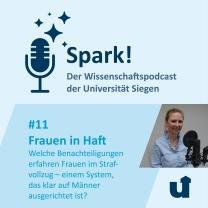
Women are an absolute minority in the prison system: in Germany, only around six to eight percent of all prisoners are women. The few female prisoners are therefore forced to cope in an environment that is originally geared towards men. What this means in practice - i.e. in prisons - is something that sociologist Dr. Anika Gomille from the University of Siegen and her team have been researching for several years. During their field studies in a prison, the researchers have not only come across disadvantages caused by external factors, but have also repeatedly come across prevailing gender stereotypes and role models. In this podcast episode, Prof. Gomille explains how these affect female prisoners and how ethnographic field research in a prison actually works.
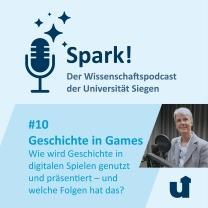
Computer games are the most popular entertainment medium of our time. Many major games or game series use historical settings and are therefore very successful: examples include Assassin's Creed, Civilization, the games in the Anno series or, most recently, the medieval game Manor Lords. The historian Prof. Dr. Angela Schwarz from the University of Siegen has been working on the representation of history in digital games for over 20 years and is considered a pioneer in this field. This podcast episode is about how history is staged in computer games: Why are historical settings so attractive to game developers? To what extent can players actually "experience" history in games? What images of history are actually created as a result - and is it okay for games to fill historical grey areas with fiction and instrumentalize history for the benefit of game mechanics?
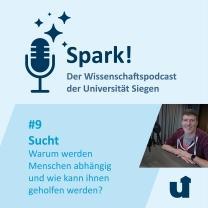
Millions of people in Germany suffer from an addiction. Nicotine and alcohol addictions are the most common, and cannabis is also widespread. However, those affected are not always addicted to substances; behaviors can also be addictive. A relatively new phenomenon is addictive behavior that arises from Internet use - online gaming, excessive consumption of pornography or Internet shopping addiction. Why and how do people develop addictions? Which processes in the brain play a role? Can similar processes be observed in behavioral addictions as in substance-related addictions? And above all: how can those affected be better helped? That's what this podcast episode with Siegen psychology professor Dr. Tim Klucken is all about.
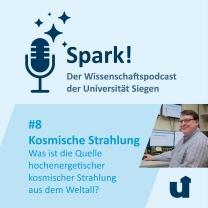
Cosmic radiation from outer space is constantly hitting the Earth's atmosphere. These are tiny particles that we cannot feel or see - but some of which are charged with extremely high energies. Some cosmic particles even carry ten million times more energy than can be generated by the world's largest particle accelerator. Scientists have not yet been able to clarify which cosmic processes or objects generate these extreme energies. To get to the bottom of this mystery, physicists from the University of Siegen are involved in the world's largest experiment for researching cosmic rays: the Pierre Auger Observatory in Argentina. Siegen astroparticle physicist Dr. Marcus Niechciol reports on how this special experiment works and what the researchers have been able to find out so far.
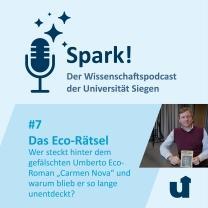
By chance, literary scholar Dr. Niels Penke from the University of Siegen discovered a previously unknown novel by Italian author Umberto Eco on eBay - and quickly revealed it to be a forgery when he read it. Last February, he publicly expressed his suspicions on the platform X (then still Twitter). Since then, a kind of literary detective hunt for the true author - or the true authoress - of the little book has been underway. In this special podcast episode, Niels Penke tells us what he has already been able to find out about the novel "Carmen Nova", which interesting people he has met in the course of his research - and which leads he still wants to pursue: from paper forensics, to a literary text analysis with AI, to a public prosecutor who investigated pirate printing circles in the 1980s.
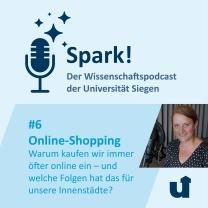
Many people no longer drive into town to shop, but instead store from the comfort of their own home via smartphone or laptop. Sales in German online retail have been rising continuously since the turn of the millennium, and the pandemic in particular has recently given online shopping a boost. Why does online shopping mainly take place on large platforms such as Amazon? What about consumer protection? Is online shopping worse for the environment than shopping in bricks-and-mortar stores? And what can we do to reduce returns? These questions and what it actually means for our city centers when we increasingly shop online instead of in stores are the subject of a discussion with Dr. Hanna Schramm-Klein, Professor of Marketing and Retail at the University of Siegen.
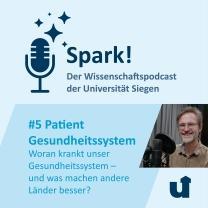
Expenditure on healthcare in Germany has been rising for years and recently reached a record level of almost half a trillion euros. Despite this, our healthcare system does not perform well in many areas compared to other countries: in terms of digitalization, Germany is lagging behind in Europe.
Germany is one of the worst performers in Europe when it comes to digitalization, doctors and nurses have to care for far more patients in our hospitals than the EU average, and the organization of care services is extremely complicated and largely falls on the shoulders of patients and their relatives. Why is it all like this? What do other countries do and what can we learn from them? This is the subject of the latest podcast with health sociologist and University of Siegen professor Dr. Claus Wendt.
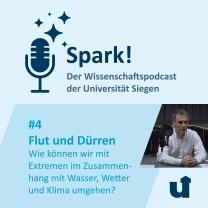
Almost two years after the flood disaster in Germany, the images of the devastation are still very much with many people. Masses of water repeatedly cause major damage, most recently in northern Italy in spring 2023. On the one hand, human intervention in nature and global warming associated with climate change encourage flooding. On the other hand, we repeatedly experience periods of extreme dryness and drought. How can we better deal with these extremes in connection with water, weather and climate? How can flood warning systems be improved? What adaptations are necessary to minimize the damage caused by floods and droughts? Hydrologist Prof. Dr. Paolo Reggiani from the Water and Environment Research Institute at the University of Siegen explains in the podcast.
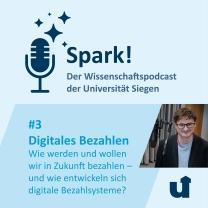
More and more people in Germany are paying digitally instead of in cash. The coronavirus pandemic has accelerated this trend even further since 2020. But although we use it less and less in everyday life, we Germans are more attached to cash than people in other countries. Why is that? How will digital payment systems develop in the coming years and which payment markets already exist in other countries? How do we want to and will we pay in the future? The cultural and media scientist Dr. Sebastian Gießmann teaches and researches at the Media Studies Seminar and the Collaborative Research Center "Media of Cooperation" at the University of Siegen. He has been working intensively on digital payment since 2016. In the podcast, he explains why he is in favor of retaining traditional cash - and why he would also like to see the digital euro.
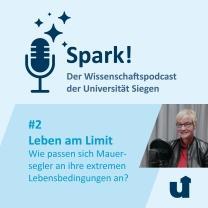
Swifts lead an extreme life: The migratory birds spend up to ten months a year continuously in the sky - eating, drinking and sleeping entirely in flight. In spring, the swifts return from their wintering grounds in Africa to breed in Europe before setting off again in late summer. One of the largest breeding colonies of swifts in the whole of Germany is located inside the Ronnewinkel viaduct near the town of Olpe. Biologist Prof. Dr. Klaudia Witte from the University of Siegen has been researching this colony for over 15 years: She wants to find out what strategies the swifts use to adapt to their extreme living conditions. In the podcast, she provides insights into the extraordinary life of the birds and her exciting research work in the breeding chambers inside the car bridge.
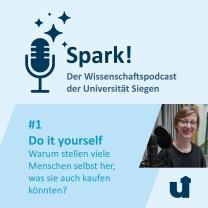
From baking cakes to DIY to growing tomatoes: DIY - or do it yourself - is a popular leisure activity for many of us. Why do people make things themselves that they could also buy? What difference does it make whether someone does it themselves as a hobby or is forced to do so for financial reasons? And what influence do social expectations, gender roles and crises such as the coronavirus pandemic have on DIY? Prof. Dr. Reinhild Kreis holds the Chair of "History of the Present" at the University of Siegen and has been researching the topic of DIY for many years. In the podcast, she explains when DIY actually began historically and what different trends and currents it has been subject to over the years - and still is today.

